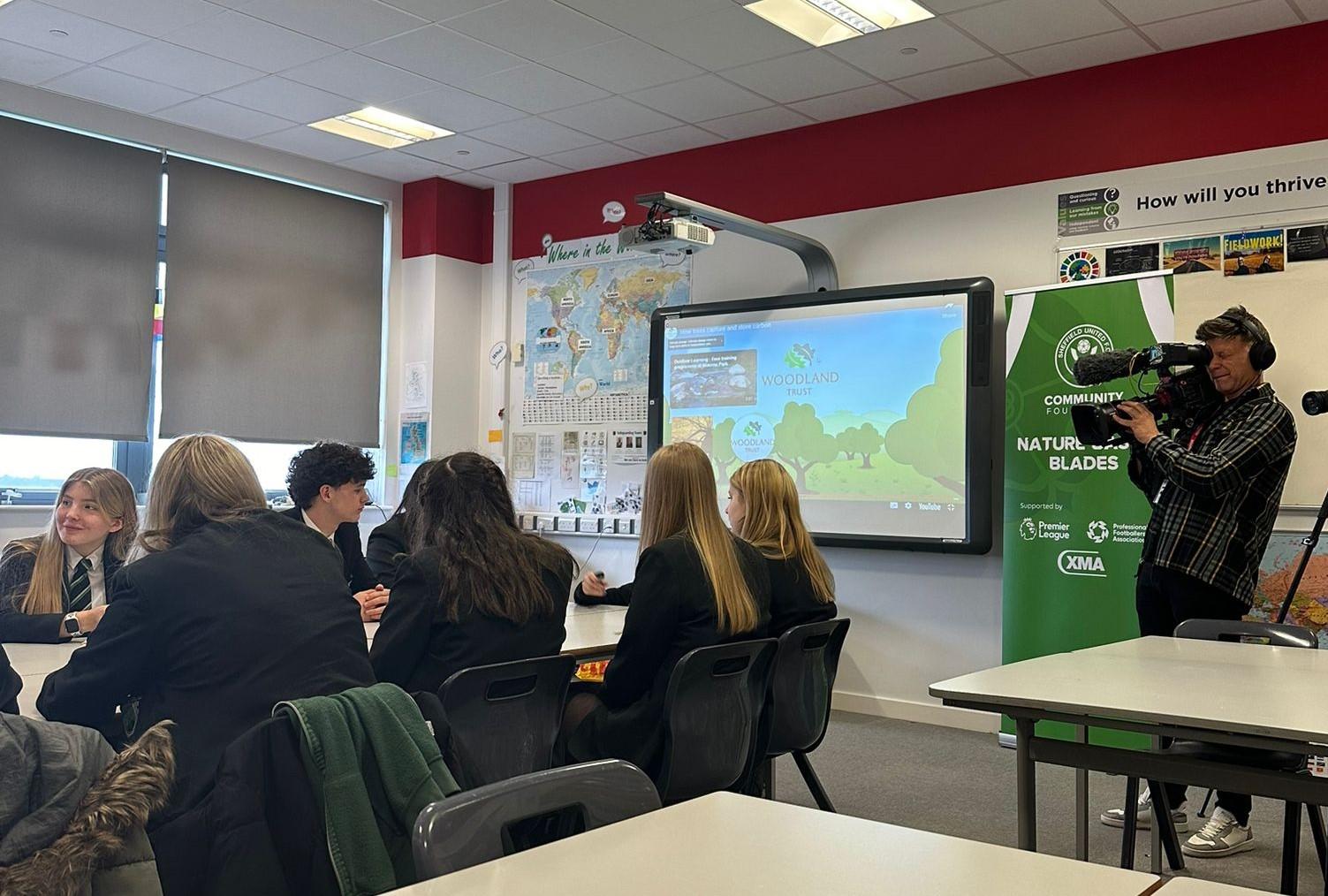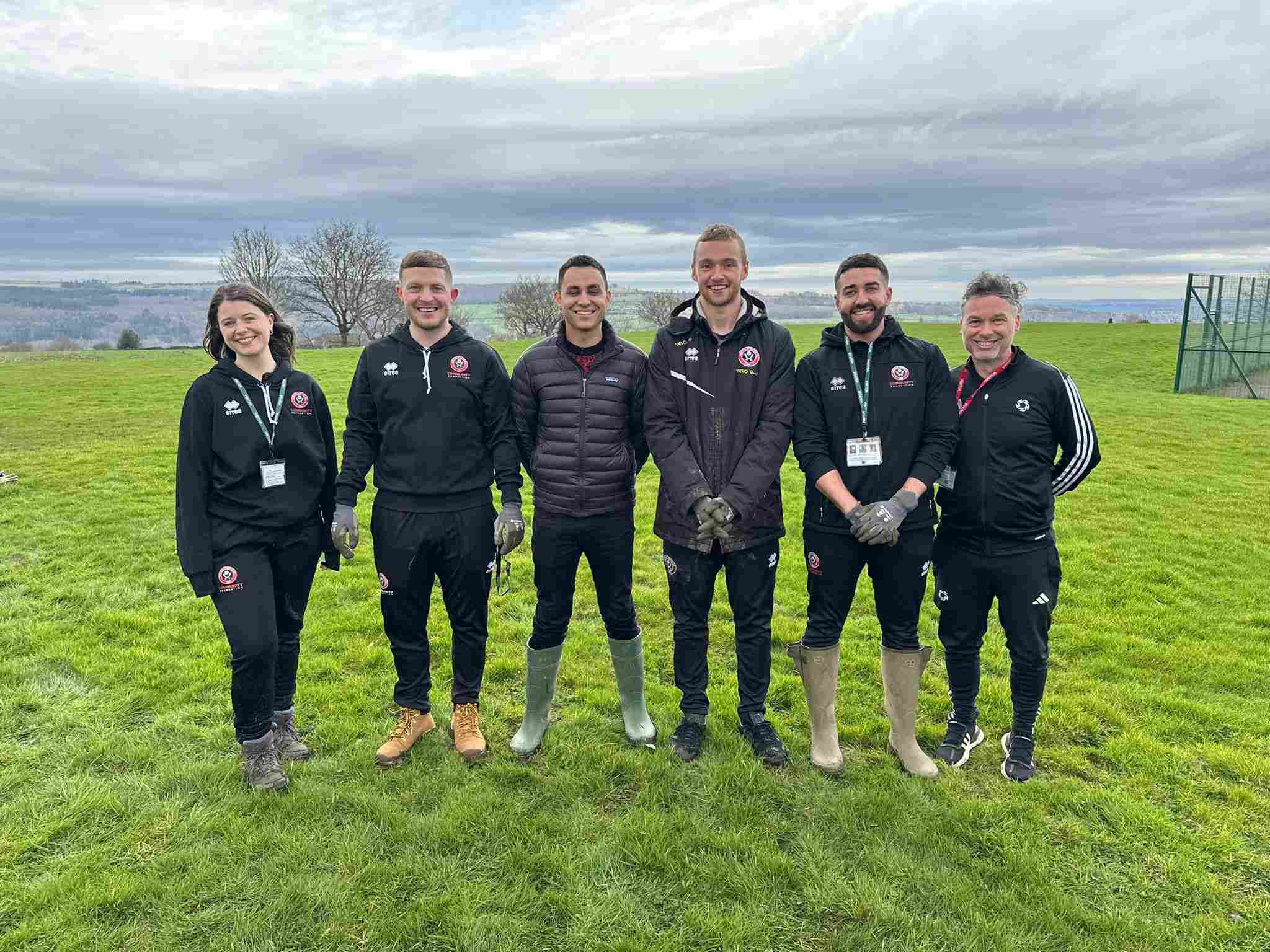Thessaloniki gets ready for its metro launch in November
The underground rapid transit lines have been under construction for almost two decades due to various project delays
 TheMayor.EU logo
TheMayor.EU logo 
Planting trees together as part of the Nature Based Blades project to promote sustainable urban development, Source: Sheffield United Community Foundation
As the world becomes more urbanised, our cities are facing major challenges. Climate change, social inequality and the loss of green and community spaces are putting pressure on urban life around the world. Sustainability and social responsibility are becoming increasingly important, and innovative solutions are more in demand than ever. Increasing and enhancing urban nature helps address these challenges by providing innumerable environmental, health, and social benefits, including improved air quality, bolstered mental health, and reduced summer temperatures.
An unlikely force is emerging to combine environmental initiatives with social action: football. Football clubs - the heart of many cities and towns - provide a platform to promote sustainability, education and social justice (Nelson Mandela 2000, cited in Mukherji 2023). With their vast reach and deep roots in the community, football clubs are well situated to bring about positive change not only in the sporting arena, but also in the urban environment. City leaders should take note - partnerships with football clubs can help local and regional authorities address urban challenges such as creating greener public spaces, sustainable urban planning and youth engagement.
Say it loud for those in the back - Football has the power to change the world. This conviction is not new: sport is recognised as a fundamental right and a powerful tool for strengthening social ties, promoting sustainable development and fostering peace, solidarity and mutual respect. In cities, where the need for environmental and social solutions is particularly great, football offers unique opportunities to support local infrastructure development and mobilise communities to achieve common environmental and social goals. The draw is especially stark among young people.
Cities and sports clubs around the world are already putting this knowledge into practice: Spain’s Real Betis integrated green spaces and native plants into their sports facilities, offered employees access to scooters and electric bikes, and encouraged fans to also make use of active transport. Football Ecology France facilitated a partnership between the city of Médard en Jalles, local football clubs, and community members that resulted in the planting of an urban forest.
ICLEI Europe, a network of over 1400 cities dedicated to sustainable urban development, is teaming up with the European Football for Development Network (EFDN), the EU Horizon project NBS EduWORLD to further demonstrate how football clubs can get involved in sharing knowledge about nature-based solutions (NbS) - interventions that leverage the power of healthy ecosystems to mitigate climate change impacts while enhancing biodiversity- and inspiring action. Their work is of particular relevance to city officials interested in replicating their results.
What makes these initiatives so effective is the close relationship between football clubs and their local communities. For example, in a recent survey by the Football for Climate Justice project, in which EFDN is also a partner, found that 53% of respondents thought that football clubs should play a role in developing solutions to climate change.
Football clubs enjoy a high level of trust and are in close contact with the people in their cities. This unique position allows them to communicate important social issues, such as climate change, directly to their fans and the wider community. The results of the survey also show that 79% of respondents feel strongly connected to their football club. This makes it clear that football is more than just a game. Football clubs have the potential to make an impact far beyond the pitch and strengthen urban communities, promote sustainable thinking and offer long-term solutions to the challenges of our time. Through the efforts of EFDN, projects such as NBS EduWORLD are realising this potential.
 Workshop on environmental education and NbS as part of the Nature Based Blades project. Copyright by Sheffield United Community Foundation
Workshop on environmental education and NbS as part of the Nature Based Blades project. Copyright by Sheffield United Community Foundation
The Nature Based Blades project, run by Sheffield United Community Foundation, an EFDN member and indirect partner of NBS EduWORLD, is a particularly impressive example of how football and education can work together in cities. Their work goes beyond training and competing on the pitch, and extends into the realm of environmental education. In short, the project uses football as the platform to model the positive impacts of NbS, and to inspire local action.
The project is based in Sheffield, a city of over 550,000 people known for its mix of urban and green spaces and home to key industries such as manufacturing, education and sport, all set against a backdrop of a rich industrial heritage and proximity to the rural Peak District. Nature Based Blades integrates environmental education into the day-to-day running of the football club, providing an alternative, playful form of education for young people who may struggle with traditional learning methods. This project shows how clubs like Sheffield United can use their social reach to raise awareness of environmental issues, and create links between recreation, environmental activism, and student education. Football clubs can be more than just sporting institutions - they have the potential to serve as community centres. Projects such as Nature Based Blades show that they can shape the urban space so that it better meets the needs of local residents.
 Footballers and students take action: Joyfully anticipating making a difference to the environment. Copyright by Sheffield United Community Foundation
Footballers and students take action: Joyfully anticipating making a difference to the environment. Copyright by Sheffield United Community Foundation
By integrating NbS into their educational programmes, football clubs are not only engaging with local communities, but also promoting environmental awareness and sustainable practices. By partnering with city planners and local officials, they even have the potential to promote greener public spaces, eco-friendly transport, and inclusive community facilities. Their reach can help shape policies around sustainability and environmental justice, ensuring equitable urban development. As these initiatives grow, the question remains: How can we further harness the power of football to create a more sustainable and connected urban future?
Main authors: Almut Ballstaedt (ICLEI Europe), Kassia Rudd (ICLEI Europe)
Contributors: Kelly Baldwin Heid (ICLEI Europe), Matheus Cavalcanti (EFDN), Clotilde Mahé (ICLEI Europe) and Philipp Reissner (EFDN)

The underground rapid transit lines have been under construction for almost two decades due to various project delays

Now you can get your wine in Talence by paying directly in Bitcoin

That’s because the state has to spend money on updating the railway infrastructure rather than subsidizing the cost of the popular pass

Rethinking renewable energy sources for the urban landscape

The examples, compiled by Beyond Fossil Fuels, can inform and inspire communities and entrepreneurs that still feel trepidation at the prospect of energy transition

Now you can get your wine in Talence by paying directly in Bitcoin

The 10th European Conference on Sustainable Cities and Towns (ESCT) sets the stage for stronger cooperation between the EU, national and local level to fast track Europe's transition to climate neutrality.

At least, that’s the promise made by the mayor of Paris, Anne Hidalgo

The underground rapid transit lines have been under construction for almost two decades due to various project delays

At least, that’s the promise made by the mayor of Paris, Anne Hidalgo

Hostal de Pinós is located in the geographical centre of the autonomous region

Despite its church-y name, the district has long been known as the hangout spot for the artsy crowds

Urban dwellers across the EU are having a say in making their surroundings friendlier to people and the environment.

Forests in the EU can help green the European construction industry and bolster a continent-wide push for architectural improvements.

Apply by 10 November and do your part for the transformation of European public spaces

An interview with the Mayor of a Polish city that seeks to reinvent itself

An interview with the newly elected ICLEI President and Mayor of Malmö

A conversation with the Mayor of Lisbon about the spirit and dimensions of innovation present in the Portuguese capital














